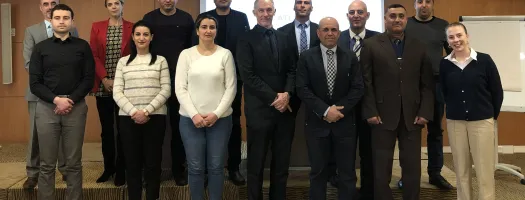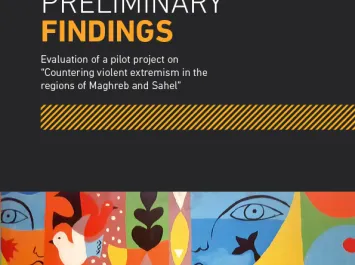On 30 January 2023, the United Nations Interregional Crime and Justice Research Institute (UNICRI) held a one-day workshop in Tunis to consult with Tunisian authorities in charge of preventing and combating the threats stemming from potential chemical weapons attacks conducted by violent non-state actors. The workshop was conducted within the framework of the project “ATLAS – Preventing non-state actors from planning and carrying out chemical weapons attacks through intelligence-led operations” and was complemented by bilateral meetings on 31 January 2023.
Over the course of the two days, UNICRI’s experts met with representatives from agencies with different mandates pertaining to preventing, countering and responding to chemical risks, including the Ministry of Defence; the National Customs Authorities; the National Counter-Terrorism Unit; the Police Forensics Department; and the General Directorate of Training at the Ministry of the Interior. The workshop and the bilateral meetings focused on topics such as available assets (existing training, human resources, expertise and equipment); national and international cooperation; and future actions, as well as the logistical aspects of the training programme.
The workshop consisted of plenary activities to identify Tunisia’s needs with regard to capacity building in the area of chemical weapons security, with discussions on the potential topics to be included in the training curriculum on intelligence-led operations. In addition to the group discussions, participants performed an analysis of different hypothetical risk scenarios in order to assess the potential threat of a chemical weapons attack. UNICRI used the workshop as an opportunity to provide participants with detailed information on the project, its structure and methodology, while national authorities delivered presentations on their current capacities and previous experience vis-à-vis chemical security.
The consultations were an excellent opportunity to meet key stakeholders in the area of chemical weapons security and contributed to the identification of common goals and actions to strengthen national, international and regional cooperation, share knowledge, and enhance capacities to prevent chemical weapons attacks. As a next step, UNICRI will finalize the training curricula on intelligence-led operations to thwart chemical weapons attacks which are specifically developed for security, law enforcement and intelligence officers and start arrangements for the train-the-trainer session that is expected to be delivered in the third quarter of 2023.
About ATLAS: Preventing non-state actors from planning and carrying out chemical weapons attacks through intelligence-led operations.
ATLAS is a pilot project which aims to prevent non-state actors from planning and carrying out chemical weapons attacks by developing and implementing training programmes. Designed within the framework of the European Union (EU) Chemical, Biological, Radiological and Nuclear (CBRN) Centres of Excellence (CoE) Initiative, the ATLAS project is implemented by the United Nations Interregional Crime and Justice Research Institute, in cooperation with the Federal Bureau of Investigation (FBI) and with the financial support of the United States (U.S.) Department of State (DoS).



